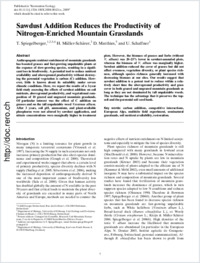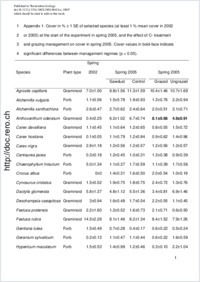Sawdust addition reduces the productivity of nitrogen-enriched mountain grasslands
- Spiegelberger, Thomas CABI Europe-Switzerland, Delémont, Switzerland - Department of Biology, University of Fribourg, Unit Ecology and Evolution, Switzerland - Cemagref de Grenoble, Research Unit Mountain Ecosystems, Saint-Martin-d'Hères, France -
- Müller-Schärer, Heinz Department of Biology, University of Fribourg, Unit Ecology and Evolution, Switzerland
- Matthies, Diethart Department of Biology, University of Marburg, Germany
- Schaffner, Urs CABI Europe-Switzerland, Delémont, Switzerland
-
24.06.2008
Published in:
- Restoration Ecology. - 2008, p. 10.1111
carbon addition
competitive interactions
European Alps
multisite field experiment
seminatural grasslands
soil nutrient availability
restoration
English
Anthropogenic nutrient enrichment of mountain grasslands has boosted grasses and fast-growing unpalatable plants at the expense of slow-growing species, resulting in a significant loss in biodiversity. A potential tool to reduce nutrient availability and aboveground productivity without destroying the perennial vegetation is carbon (C) addition. However, little is known about its suitability under severe climatic conditions. Here, we report the results of a 3-year field study assessing the effects of sawdust addition on soil nutrients, aboveground productivity, and vegetational composition of 10 grazed and ungrazed mountain grasslands. Of particular interest was the effect of C addition on grasses and on the tall unpalatable weed Veratrum album. After 3 years, soil pH, ammonium, and plant-available phosphorus were not altered by sawdust application, and nitrate concentrations were marginally higher in treatment plots. However, the biomass of grasses and forbs (without V. album) was 20–25% lower in sawdust-amended plots, whereas the biomass of V. album was marginally higher. Sawdust addition reduced the cover of grasses but did not affect evenness, vegetation diversity, or plant species richness, although species richness generally increased with decreasing biomass at our sites. Our results suggest that sawdust addition is a potent tool to reduce within a relatively short time the aboveground productivity and grass cover in both grazed and ungrazed mountain grasslands as long as they are not dominated by tall unpalatable weeds. The technique has the advantage that it preserves the topsoil and the perennial soil seed bank.
- Faculty
- Faculté des sciences et de médecine
- Department
- Département de Biologie
- Language
-
- English
- Classification
- Biological sciences
- License
-
License undefined
- Identifiers
-
- RERO DOC 11259
- DOI 10.1111/j.1526-100X.2008.00424.x
- Persistent URL
- https://folia.unifr.ch/unifr/documents/301037
Other files
Statistics
Document views: 129
File downloads:
- pdf: 229
- Supplementary material: 113

